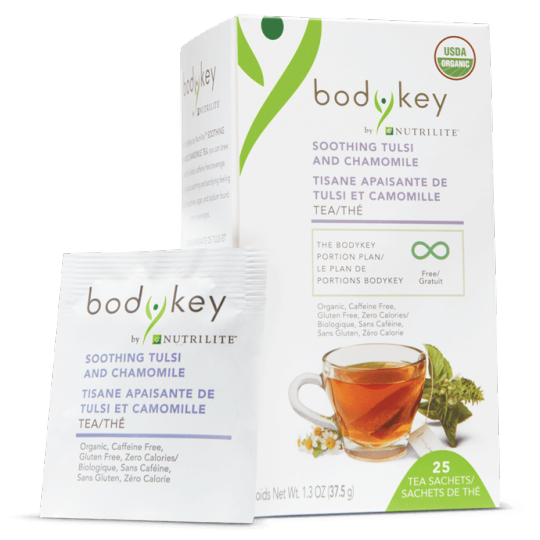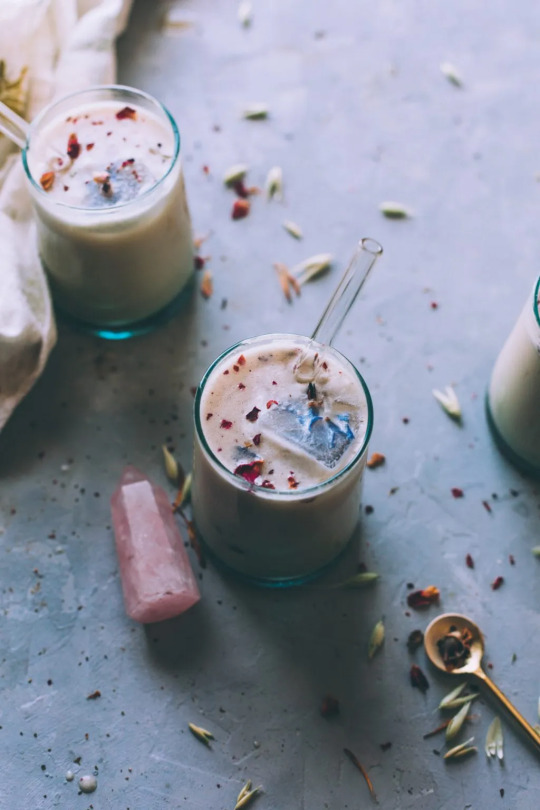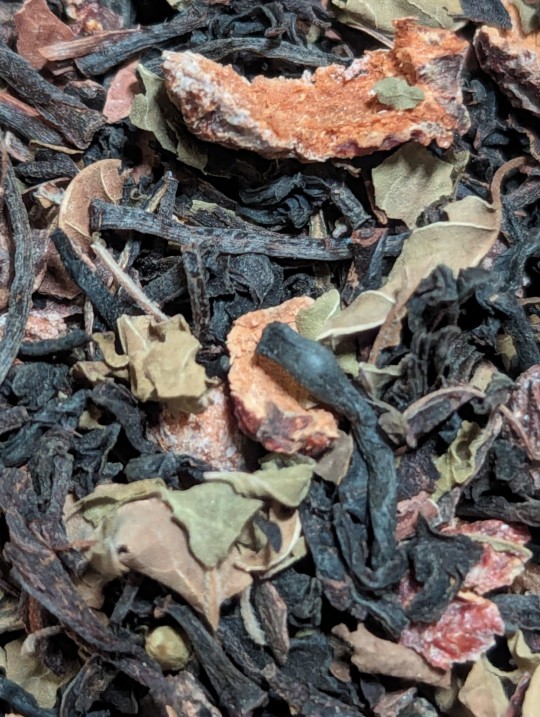#Tulsi tea
Explore tagged Tumblr posts
Text

so in love with this nervine salve i made last night for my apothecary, it’s infused with lavender, rose, elderflower, and holy basil, with a touch of pink grapefruit essential oil to give it a shimmery fragrant finish. so comforting and grounding✨
#herbalism#flowers#healing#herbs#apothecary#plant based#plants#herbcraft#lavender#rose#holy basil#tulsi#tulsi tea#dried herbs#infused oil#herbal oil#essential oils#pink grapefruit#grapefruit#fragrance#perfume#salve#herbalism community#self healing#beauty#faith#positivity#spirituality#love#witchy
3 notes
·
View notes
Text

Senate votes to confirm Tulsi Gabbard as director of national intelligence READ MORE
0 notes
Text
youtube
0 notes
Text
Herbal Teas to Soothe Stress Naturally

In today’s fast-paced world, finding natural ways to unwind and relax is essential. Many people are turning to herbal teas, not only for their comforting warmth but also for their impressive health benefits. Luxmi Estates, renowned for its dedication to premium, organic teas, offers a selection of herbal blends designed to support stress relief and relaxation. In this article, we'll explore the calming properties of valerian tea, ashwagandha tea, tulsi tea, and other herbal sleep teas that can make a difference in your daily wellness routine.
1. Valerian Tea: Nature’s Answer to Deep Relaxation
Valerian root has long been celebrated for its calming effects and is commonly used to improve sleep quality. Valerian tea, derived from the valerian plant’s root, helps ease tension, making it an excellent choice for those experiencing occasional sleeplessness or mild anxiety. When consumed regularly, valerian tea supports a calm mind and deep, restorative sleep by promoting the release of gamma-aminobutyric acid (GABA), a neurotransmitter that naturally soothes the nervous system. Luxmi Estates’ valerian tea blends are made with the highest quality roots, ensuring a potent and effective herbal infusion.
2. Ashwagandha Tea: The Adaptogen for Stress Management
Ashwagandha, often called the "Indian ginseng," is an adaptogen—a natural herb that helps the body cope with stress. Ashwagandha tea is valued for its ability to balance cortisol levels, the hormone associated with stress response, and may help the body build resilience to physical and emotional stressors. Regular consumption of ashwagandha tea can enhance focus, uplift mood, and support mental clarity. Luxmi Estates incorporates ashwagandha into its herbal tea line, creating a soothing, earthy blend perfect for those seeking to ease daily stress naturally.
3. Tulsi Tea: Sacred Herb for Mind and Body
Tulsi, also known as holy basil, holds a special place in Ayurveda for its therapeutic properties. This adaptogenic herb is celebrated for its ability to support respiratory health, boost immunity, and reduce stress. Tulsi tea has a mildly sweet, peppery flavor that is both refreshing and grounding. Luxmi Estates’ tulsi tea provides a delightful way to unwind after a busy day. Drinking tulsi tea regularly can enhance your resilience to stress while promoting an overall sense of well-being.
4. Herbal Sleep Teas: Combining Calming Herbs for Restful Nights
For those looking to improve sleep quality, herbal sleep teas combine several calming ingredients, including chamomile, lavender, and valerian. These herbal blends offer a natural alternative to sleeping aids, promoting a restful night’s sleep without grogginess the next day. Luxmi Estates carefully curates herbal sleep teas that feature the perfect balance of sleep-supportive ingredients, helping you relax and prepare for a deep, restorative sleep cycle.
Why Choose Luxmi Estates?
Luxmi Estates is committed to quality and sustainability, ensuring that each tea is crafted from organically grown herbs without pesticides or additives. From valerian tea to ashwagandha tea, Luxmi Estates provides an array of options designed to fit seamlessly into your wellness routine. Each sip not only supports relaxation but also brings you closer to nature.
Conclusion
Incorporating valerian tea, ashwagandha tea, and tulsi tea into your daily routine offers a natural, enjoyable way to manage stress and promote restful sleep. Luxmi Estates’ high-quality herbal blends provide a mindful moment of calm and comfort, helping you unwind with every cup.
0 notes
Text
A single cup of tea, with the right ingredients, has the exorbitant power to transport you to an ethereal realm where only peace and calm prevail. we discovered such exquisite vedic tea blends and were very keen on sharing this ethereal experience with everyone, and that’s how ‘Yellow Turban’ was born.
1 note
·
View note
Text

Embrace the sacred essence of nature with every dried leaf of Tulsi – a symbol of purity, health, and divinity. 🌿
0 notes
Text
Tulsi Lemongrass Tea (Hibiscus Sage) - 15 Tea Bags
Experience the rejuvenating blend of Tulsi Lemongrass Tea, enhanced with the vibrant flavors of Hibiscus and Sage. This unique herbal tea offers a refreshing and invigorating experience, perfect for any time of day. Each tea bag is crafted to bring you the benefits of natural ingredients, promoting relaxation and well-being. Enjoy the aromatic fusion and elevate your tea-drinking ritual with this exquisite blend.

Key Features:
Contains 15 premium tea bags
Blend of Tulsi, Lemongrass, Hibiscus, and Sage
Natural ingredients for a healthy lifestyle
Perfect for relaxation and rejuvenation
Aromatic and flavorful
0 notes
Text
Harmony in a Cup: Discover the Delightful Organic Blend of Soothing Tulsi & Chamomile Tea by BodyKey

View On WordPress
#chamomile tea#organic green tea#organic tea#organic tulsi#organic tulsi tea#soothing drink#tulsi#tulsi tea
0 notes
Text
TULSI LEAVES TEA | HERBAL TEA | GOODB
Tulsi leaves, also known as Holy Basil, are a popular herb in Ayurvedic medicine and are often used to make tea. Here are some potential benefits of tulsi leaves tea:
1. Relieves Stress: Tulsi leaves have adaptogenic properties, which can help reduce stress and anxiety.
2. Protects and fights against infections: Tulsi leaves contain compounds that have antimicrobial properties, which can help fight against various types of infections.
3. Maintains Oral Health: Tulsi tea contains compounds with antimicrobial properties, which can help fight against harmful bacteria and other microorganisms in the mouth. The strong, pungent aroma of tulsi tea may help freshen breath and improve oral hygiene. It may also help reduce inflammation in the gums and other parts of the mouth. Tulsi tea has analgesic properties and may help relieve toothache and discomfort associated with oral conditions.
4. Promotes Respiratory Health: Tulsi leaves have expectorant properties and may help relieve respiratory issues such as coughs and colds.
5. Immune System Booster: Tulsi leaves have antimicrobial properties and can help boost the immune system.
GOODB Tulsi leaves tea can be made by steeping GOODB dried tulsi leaves in hot water for several minutes. The tea can be consumed plain or with the addition of honey or lemon for flavor.

0 notes
Text
Wow they finally invented kratom that tastes good
#Use responsibily#cw drugs#top tree herb's white vein tea with cacao nibs#I tried the green vein and tulsi one and it was ok too
78 notes
·
View notes
Text
hard day hard week etc etc had not much food left and got myself little treats in the supermarket. one little treat i like to get sometimes is trying a new tea. im going to try assam .
#i tried white tea and didnt like it much but ill try it again .#other black teas that i like : darjeeling and lapsang souchong#tho lapsang souchong seems to be quite difficult to find now ?#the one i last found was just 'inspired by' and wasnt vry good#other types of tea: big fan of ginger. tulsi . nettle. things with fennel and lemongrass etc. genmaicha and green#i dont like fruits in tea or hibiscus#hibiscus is the herbal tea ruiner . booooo. booooooo#i like chai but only sometimes. best chai i had was made in the proper way with like jaggary and stuff#kiddo say
44 notes
·
View notes
Text

Iced Oatstraw Tulsi Rose Moon Milk (Vegan)
#vegan#drinks#moon milk#iced tea#coconut milk#herbs#oatstraw#tulsi#rose#vegan collagen#vanilla#stevia
36 notes
·
View notes
Text
Your Complete Guide to Ayurvedic Treatments: Balancing Mind, Body, and Soul

Introduction: The Holistic Approach of Ayurveda
Ayurveda's Wisdom: Harmonizing the Human Body with its Environment
Ayurveda's outlook is as holistic as it gets. It sees the human body as intricately linked to its surroundings. Any shifts in the environment reflect in our physical, mental, emotional, and spiritual well-being.
The Heart of Ayurvedic Treatments: Harmony and Root-Cause Healing
More Than Skin Deep: Treating the Source, Not Just the Symptoms
Unlike conventional medicine's focus on symptom suppression, Ayurvedic treatments are all about targeting the root cause. This system aims for a perfect symphony between mind, body, and soul, paving the way for a vibrant and ailment-free life.
Demystifying Ayurvedic Treatment/Therapy
Balancing Act: Herbal Remedies and Lifestyle for Optimal Energy
Ayurvedic therapy marries herbs and lifestyle shifts to balance the three key body energies—Vata, Pitta, and Kapha. These doshas play differently in everyone, and the predominant one defines your unique constitution or Prakriti. Ayurveda believes that diseases stem from vitiated doshas, often triggered by external and internal factors like diet and physical activity.
The Ayurvedic Diagnostic Dance
Pulse and More: Naadi Pariksha and Ashtavidha Pariksha

Two key diagnostic tools in Ayurveda: Naadi Pariksha (pulse checking) and Ashtavidha Pariksha (in-depth examination). Skilled practitioners decode these to understand your physiological and psychological makeup, revealing dosha imbalances.
The Ayurvedic Healing Recipe
Tailored Treatment: Symptomology, Dominant Dosha, and More
Your Ayurvedic practitioner crafts a unique plan—factoring in your symptoms, dominant dosha, and constitution. The prescription blends herbal remedies, dietary tweaks, exercises, and lifestyle shifts. And here's the truth: Ayurveda can complement modern medicine when your doctor gives the nod.
The Ayurvedic Treatment Menu
A Deeper Dive into Ayurvedic Therapies
Discover some captivating Ayurvedic treatments that play in harmony with your doshas, reviving your mind, body, and soul's equilibrium.
Abhyanga Massage: Loving Your Body, Head to Toe
From Crown to Toes: Abhyanga's Stress-Melting Strokes
Abhyanga is the full-body hug you need. Medicated oil, warm and gentle strokes—this self-administered massage says goodbye to stress, spurs circulation, and eases inflammation. Different herbs, different results.
Kati Vasti: Soothe the Lumbar Symphony
Trouble in Your Lower Back? Enter Kati Vasti
For lumbar blues, there's Kati Vasti. Think a doughy well holding warm oil on your lower back. The result? A gentle, soothing treat for those tender areas.
Elakizhi: A Herb-Fueled Perspiration Party
Let's Sweat It: The Elakizhi Induced Glow
Perspiration is golden, and Elakizhi coaxes it out with herb-stuffed muslin and warm oil. Say adieu to stress, soreness, and body aches.
Njavara Kizhi: Rice, Milk, and Muscles Unwind
Rice and Milk for Aching Muscles: Njavara Kizhi
Ayurveda goes grainy with Njavara Kizhi. Cooked rice, milk, and herbal pouches caress your muscles, bringing relief to your aches and strains.
Panchakarma: A Week of Body Magic
Toxin Tryst: Panchakarma's Ancient Detox Ritual

Panchakarma is detox's A-lister. Over a week, it revs up your body's self-cleansing machinery. Five therapies, one goal: a toxin-free, vibrant you.
Varicose Veins Treatment: Vein Voyage with Ayurveda
Varicose veins meet their match in Ayurveda. A blend of herbs and oils could be your ticket to improved vein health.
Psoriasis Treatment: Soothing the Skin Symphony
Psoriasis's no match for Ayurveda's herbal pastes and skilled hands. A natural approach to taming the itchy, flaky beast.
Shirodhara: Oil and Calm for Your Mind's Sea
Heated oil meets your forehead in Shirodhara. This 60-90-minute serenade relieves stress, anxiety, and headaches. Let your cares drift away.
Ayurvedic Treatment's Inner Mechanics
Decoding Ayurvedic Healing: Ancient Wisdom at Work
Ayurveda? It's 'knowledge of life.' With its 3,000-year history, it's your holistic roadmap. Cleanse, diet, herbs, massage, meditation—these are your keys to mastering balance and vitality.
Ayurvedic Healing's Timeframe
Patience Pays: The Slow-and-Steady Success of Ayurveda
Ayurvedic therapies don't snap their fingers for instant fixes. They're about sustainable solutions. Dosha harmony, natural healing, resilience building—it takes time.
Perks of Ayurvedic Treatment: A Life Well-Lived
Ayurveda's Bounty: From Weight to Immunity, It Has You Covered
Ayurveda isn't just ancient—it's wise. From weight balance to stress relief, radiant skin to strong immunity, Ayurveda brings ancient goodness to modern lives.
Conclusion: Balancing Act for a Flourishing Life
Ayurveda's Dance of Harmony: Mind, Body, and Soul in Sync
Ayurveda is your holistic partner, orchestrating your doshas' melody for a harmonious existence. Modern medicine plays its part, too, but with your doctor's nod, these two systems can unite for your well-being.
Remember, Ayurveda isn't just a quick fix—it's a journey to your best self.
Are you on the hunt for top-notch Ayurvedic herbal supplements in India? Look no further – Aadav Ayurveda has got you covered! Let's dive into why Aadav Ayurveda is your ultimate destination for all things Ayurvedic.

#ayurvedic treatment#ayurvedicmedicine#herbalism#plant medicine#plant magic#green witchcraft#green witch#trauma#trauma healing#complex trauma#ashwagandha#tulsi#ayurveda#cannabis#cannawitch#meadowsweet#linden#rose#tea magic#tea witch#kitchen witchcraft#kitchen witch#queer herbalism#witchblr#witch#herbs#animism#animist herbalism#long post#my writing
12 notes
·
View notes
Text
currently thinking about how katrina makes very good tea because she can use leaves from the plants that she grows.. she will make your muse tea if they are at her place and they want tea
#she currently has chamomile; lemon verbena; tulsi; lavender; and mint!#will your muse accept her tea yes or no#‘ ganz interessant ‘ - headcanons.
6 notes
·
View notes
Text
Buy Luxmi Estates Tulsi Tea: Natural Wellness Blend

Discover the rejuvenating power of Luxmi Estates Tulsi Tea, a premium blend crafted for natural wellness. Rich in antioxidants and known for its calming properties, this herbal infusion supports immunity and promotes relaxation. Buy now to enjoy the soothing benefits of Tulsi, a revered herb in Ayurvedic traditions, and elevate your daily tea ritual with Luxmi Estates.
0 notes
Text

2023 tea via my "see results" Tumblr votes.
#build a tea#organic tea#dsntealab#build a tea 2023#There & Back Again#Cacao Shells#Cardamom#Hawthorn Berries#Tulsi
5 notes
·
View notes